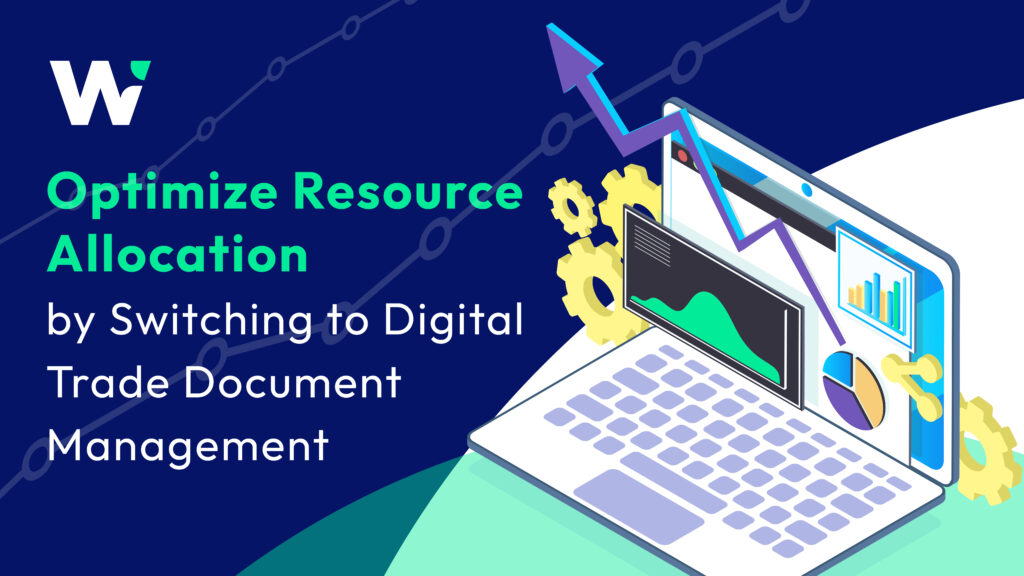In logistics and shipping, staying ahead of the curve means making the most of your resources.
Traditional paper-based trade document management systems might seem reliable, but in reality, they’re slowing you down. Difficult to manage, time-consuming, and prone to errors, these outdated methods drain valuable resources and hinder your ability to make swift, accurate decisions.
But there’s a better way.
By transitioning to digital trade document management, you can streamline operations, reduce costs, and significantly enhance your overall efficiency.
In this blog post, we’ll explore how adopting digital solutions like WaveBL’s electronic trade document management solution, which includes electronic Bills of Lading (eBL), can reshape resource allocation in the shipping and logistics industry.
The Challenges of Traditional Trade Document Management
Inefficiency and Time Consumption
If you’ve ever dealt with traditional trade document management, you know it’s a laborious process. Physical documents need to be printed, transported, and stored, consuming time and resources at every step. Delays, bottlenecks, and lost documents are all too common, creating a frustrating experience that hinders your ability to stay competitive.
High Operational Costs
Let’s talk about the costs. Managing paper-based documents isn’t cheap. The expenses add up quickly, from printing and shipping to storage and labor. But the financial impact doesn’t stop there. Waiting for paper documents, often delayed or lost, can result in ships idling at ports, incurring costly demurrage fees. These fees can range from an average of $75 to $300 per day and increase exponentially with each passing day.
Additionally, the costs of printing large volumes of documents, shipping them between parties, and storing them securely can significantly strain your budget. Labor costs also rise as manual handling of documents requires significant manpower.
Errors in manual processes can lead to discrepancies, non-compliance with regulations, and costly penalties or reprocessing. And when documents are lost or damaged, the expenses can skyrocket as you deal with replacement and potential delays.
When you factor in these various expenses, it’s clear that traditional paper-based document management can significantly drain resources, both financially and operationally.
Risk of Errors and Non-Compliance
Manual processes are also prone to errors. A simple mistake can lead to costly discrepancies, non-compliance with regulatory requirements, and even damage to your reputation. Ensuring compliance through these manual methods is not only inefficient but risky.
The Benefits of Digital Trade Document Management
Streamlined Operations and Increased Efficiency
Switching to digital trade document management means no more worrying about lost documents or delays. With WaveBL’s eBL solution, you can create, share, and store documents electronically, significantly reducing processing times and eliminating manual handling. Real-time document transfer and verification lead to faster turnaround times and smoother operations.
Cost Reduction
Going digital isn’t just about speed—it’s about savings, too. By reducing the need for printing, shipping, and storage, you can cut down on operational costs. WaveBL’s eBL solution also automates many processes, reducing labor costs and minimizing errors that could lead to financial penalties.
Enhanced Security and Compliance
Security is vital in trade, and that’s where digital solutions shine. WaveBL’s eBL utilizes blockchain technology to create a secure, tamper-proof ledger for your trade documents. This ensures compliance with regulatory requirements and simplifies audits, giving you peace of mind that your documents are safe and sound.
Improved Resource Allocation
When you free up time and labor from manual document handling, you can reallocate those resources to more strategic activities. By removing paper-based processes, you also eliminate the constant need to put out fires caused by delays, errors, and lost documents. This shift not only enhances productivity but also drives growth and competitiveness by allowing your team to focus on what truly matters.
Implementing Digital Trade Document Management with WaveBL
Seamless Integration and Adoption
Worried about the transition?
Don’t be.
WaveBL’s eBL solution integrates smoothly with your existing systems, making the shift from paper-based to digital document management a breeze. With a user-friendly interface and comprehensive support, you’ll be up and running in no time.
Real-Time Tracking and Visibility
Stay ahead of the game with real-time tracking and visibility. WaveBL offers transparency that allows you to manage potential issues proactively, optimize logistics planning, and ensure that your customers receive their goods on time, every time.
Sustainability and Environmental Impact
Going digital isn’t just good for your business—it’s good for the planet. By reducing paper usage, you’re minimizing your environmental footprint and supporting your sustainability goals. WaveBL’s paperless solution is a step toward a greener, more responsible supply chain.
Conclusion
In an industry where efficiency and resource optimization are key, digital trade document management is a necessity, not a luxury. WaveBL’s eBL solution addresses the challenges of traditional document management, offering a secure, efficient, and cost-effective alternative.
By adopting digital solutions, shipping and logistics companies can streamline operations, reduce costs, enhance compliance, and optimize resource allocation.
Ready to transform your trade document management? Contact WaveBL today to schedule a demo and discover how our innovative eBL solution can revolutionize your operations.



